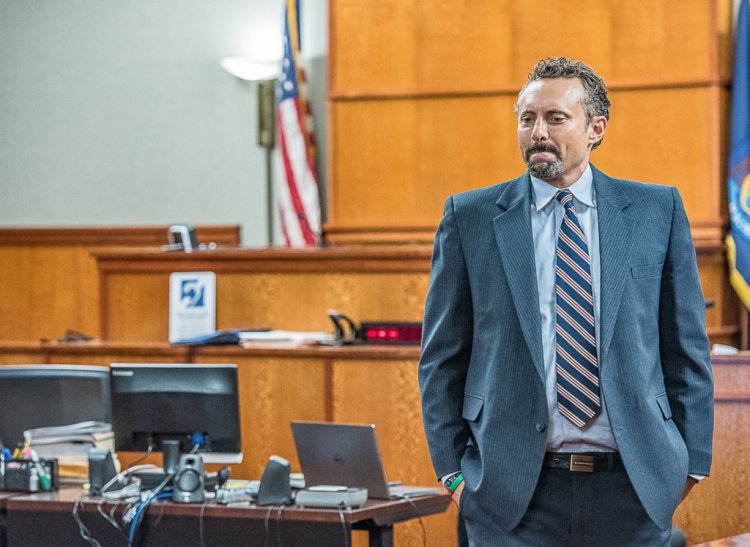Suspended Auburn attorney and recent unsuccessful candidate for district attorney Seth Carey is appealing a judge’s order for a three-year suspension for several bar rules violations.
Carey, representing himself, filed Thursday at the office of the Maine Supreme Judicial Court notice of his appeal of his suspension and a judge’s ruling that he violated Maine bar rules. The full seven-member court will hear his appeal.
Superior Court Justice Thomas Warren issued an order last month barring Carey from practicing law in Maine for three years after finding Carey had committed bar violations that included sexual assault, witness tampering and failure to comply with a previous interim suspension. Carey’s license had been suspended twice before. Carey, 43, has been barred from practicing law in Maine since April. He made an unsuccessful bid in November for district attorney of Androscoggin, Franklin and Oxford counties.
The Maine Board of Overseers of the Bar had filed a complaint against Carey last year and had argued that he be disbarred.
Although Warren agreed that disbarment would have been appropriate in this case, he wrote in his Dec. 20 sanctions order that Carey had acknowledged that mental illness likely played a role in his behavior and that he needed medication and therapy to address his mental condition.
Carey’s attorney during the rule violations and sanctions hearings, James Howaniec of Lewiston, had said of Warren’s suspension order that he and Carey were pleased he would not be disbarred and that Warren had recognized Carey’s mental health issues.
“Seth has many positive attributes, and we believe strongly that he can be a successful lawyer with the proper mental health treatment,” Howaniec had said. “Seth acknowledged that he has made some mistakes in judgment but continues to adamantly deny the allegations of misconduct made by the woman who was living at his residence for more than a year.”
That allegation resulted in a protection from harassment order in March and an interim suspension in April.
On Friday, Howaniec said Carey decided to pursue an appeal of Warren’s order “on his own” with the state’s highest court.
“He remains adamant that he did not engage in improper conduct toward the person residing at his house (in Rumford) and is hopeful that he can be reinstated on a faster timeline” than three years,” Howanic wrote in a statement.
At a Nov. 14 hearing in Cumberland County Court in Portland, Deputy Bar Counsel Aria Eee argued that Carey had numerous chances to prove his competence and get the help he’d agreed he needed during earlier license suspensions, but he had continued to violate bar rules. She said new violations, including sexual misconduct and witness tampering, should trigger loss of license for at least a five-year period after which he could petition the bar for reinstatement.
Howaniec had argued his client needed treatment for mental illness, but that his actions hadn’t warranted the “nuclear option” of disbarment. He cited instances in which licensed Maine lawyers had been merely suspended, not disbarred, for more egregious behavior.
In Warren’s Dec. 20 order on sanctions, he wrote, “Carey has for the first time acknowledged that he has a problem and should be given an opportunity to address it.”
In September, Warren had ruled in an 18-page order that Carey had violated several bar rules, including unlawful conduct stemming from his unwanted sexual advances involving a woman who lived at his Rumford home and his effort to pay for her silence about the matter. Carey also had engaged in law practice and had written checks on his professional account after his April suspension, which prohibited those actions.
Warren’s decision came a month after a three-day hearing in August at which the Maine Board of Overseers pressed its case that Carey had violated at least four bar rules.
The board’s attorneys presented evidence and witnesses, including a woman who claimed Carey, her landlord at his house in Rumford, had made persistent, unwanted sexual advances and evicted her because she repeatedly rebuffed him and, one time, recorded the wrong basketball game for him.
Seeking a protection-from-abuse order against Carey, his former tenant took him to court in April. At the end of a four-hour hearing, she was granted the order after a judge found by a preponderance of evidence that Carey had engaged in unlawful sexual touching and domestic violence assault. Carey had represented himself at that hearing, a decision he later said he regretted.
In the Dec. 20 order, Warren said that “groping a female tenant on one occasion and pulling her head against his crotch on another occasion reflected adversely on Carey’s trustworthiness and fitness as a lawyer,” but, he argued, Carey’s conduct, while serious, didn’t not fall in the most serious range because it did not involve dishonesty or fraud and did not arise from a lawyer-client relationship.
Warren also added that “the woman in question was able to rebuff all of Carey’s unwanted advances, she was not highly vulnerable to sexual exploitation, and there is no evidence that she suffered psychological injury as a result of Carey’s conduct.”
Howaniec had commented in December after Warren had issued his sanctions order there is a possibility, however slim, that the full court could impose a stricter sanction on Carey.
cwilliams@sunjournal.com
Send questions/comments to the editors.


